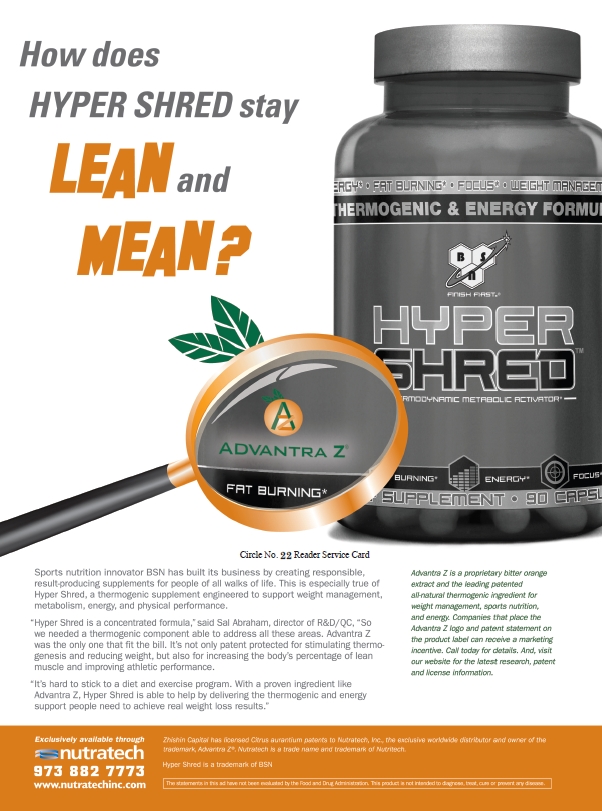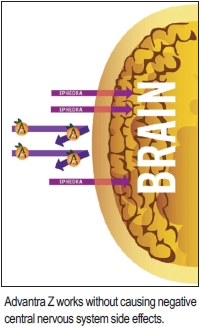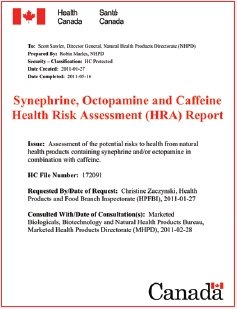“Based on the evidence reviewed, the botanical material bitter orange peel, at the doses typically used in herbal medicine and food, is not considered to pose any risk to the health of consumers.” This is the finding of “Synephrine, Octopamine and Caffeine Health Risk Assessment Report,” prepared by Robin Marles, Ph.D., Director, Bureau of Clinical Trials and Health Sciences, Natural Health Products Directorate (NHPD) of Heath Canada. Health Canada is the Canadian counterpart to the U. S. Food and Drug Administration.
The Latest Scientific Studies
The 49-page health risk assessment report includes the most comprehensive and up-to-date clinical studies and scientific literature available on Advantra Z/bitter orange, focusing on the dominant amine p-synephrine and citing more than 160 references. It examines p-synephrine’s chemistry; new in vitro, animal, and human studies; in-depth review articles on the safety and efficacy of p-synephrine alone and in combination with caffeine; and a review of comparative adrenergic receptor binding studies of the isomers and enantiomers of p-synephrine and related protoalkaloids. There are also summaries of clinical case reports and Canadian clinical case reports. Finally, the report addresses misconceptions and misinformation concerning the safety of p-synephrine.
p-Synephrine—a stable synephrine isomer—is the dominant amine in Advantra Z, a patented bitter orange (Citrus aurantium) extract and the industry’s leading natural thermogenic ingredient. It is frequently combined with caffeine in weight loss, energy, and sports nutrition products.
New Dosing Guidelines
In response to the positive findings, the report establishes new dosing guidelines.
 1 to 50 mg of p-synephrine per day for healthy adults is now classified as a Type III health risk: “a situation in which the use of, or exposure to, a product is not likely to cause any adverse health consequences.”
1 to 50 mg of p-synephrine per day for healthy adults is now classified as a Type III health risk: “a situation in which the use of, or exposure to, a product is not likely to cause any adverse health consequences.”
Products providing up to 40 mg of p-synephrine in combination with a maximum of 320 mg of caffeine per day also have Type III classifications.
Products containing greater amounts of these ingredients are now classified as Type II: “a situation in which use of, or exposure to, a product may cause temporary adverse consequences or where the possibility of serious adverse health consequences is remote.”
The report also states that Health Canada will require cautionary label statements on products containing more than 50 mg p-synephrine, noting that this dosage should be avoided by children, women who are pregnant and nursing, and people who take blood pressure and/or thyroid medications, sympathomimetics, or monoamine oxidase inhibitiors (MAOIs).
A Staple Ingredient
Previously, Health Canada’s “Guidelines for the Use of Synephrine” limited daily intake of p-synephrine to 30 mg. Products containing both p-synephrine and caffeine were prohibited without extensive human clinical studies. 
The new report notes that some types of orange juice may contain 20 mg to 25 mg or more of p-synephrine in one eight-ounce glass. It also states that although p-synephrine-containing products have been implicated in adverse event case reports, “causality is not likely due to the p-synephrine content on its own, but rather due to other ingredients.”
To review “Synephrine, Octopamine and Caffeine Health Risk Assessment Report,” as well as other Advantra Z/bitter orange research studies, visit www.nutratechinc.com/advz and click on Scientific Research.
Distributed worldwide exclusively by Nutratech, Inc., Advantra Z® is the industry’s leading, all-natural thermogenic ingredient, patent protected for stimulating thermogenesis, reducing weight, increasing the percentage of lean muscle, improving athletic performance, and suppressing appetite.

Published in WholeFoods Magazine, August 2012









